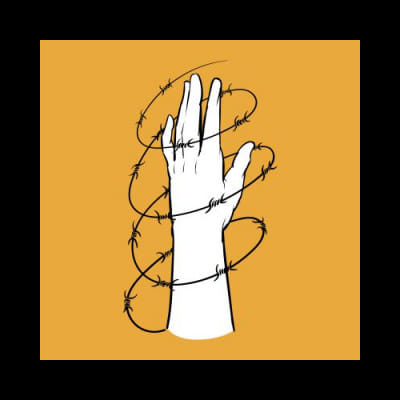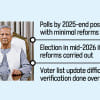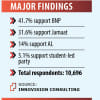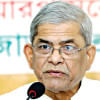It is not the system but its misuse that is at fault

The idiomatic expression, "Don't throw the baby out with the bath water", is not something we expect to use every day. The origin of it may have a cultural context but it is quite universal in its use. The idea is to caution those who, becoming overzealous in finding a solution to a problem, scrap the entire thing, including the parts which are good and functioning. To some extent, it is equivalent to the well-known Bengali phrase, "cutting the head to cure the headache". Even the most naïve among us understand that while such a solution will achieve the goal, it will come with a price that is unbearable by any standard. Of late, some conversations on the electoral system of the country are on the verge of suggesting a solution like this. The ongoing Upazila elections, particularly the empty polling centres, have become a matter of internet trolls, a subject of ridicule, although everyone understands that an election is no laughing matter. This sarcasm is obviously a sign of frustration. The media coverage of the two rounds of elections have shown not only empty polling centres, but in some cases, strolling animals were the only ones to be found there. These pictures are testimony to the fact that the voters have discovered the futility of the exercise, as was also the case with the Dhaka North City Corporation election.
The Election Commission, as an institution, has not opted for introspection; it hasn't asked, let alone tried to find an answer, to how and why this unprecedented phenomenon has become endemic. However, one commissioner has spoken. Mahbub Talukdar has commented that the existing electoral atmosphere is a "warning signal" for democracy. Is it merely a signal of an impending crisis or a reflection of the crisis itself? But what he has prescribed to cure the ill is something that warrants our attention. "Reform to the electoral process is needed for holding a meaningful election and continuation of the democracy," he said in a written statement recently (The Daily Star, March 18, 2019). The premise of the statement is not something I want to focus on here, although that too can be discussed. I am rather interested in his recommendation.
There is no doubt that the electoral system in Bangladesh, and in many other places, has flaws. One of the major reasons for the recession of democracy, particularly in consolidated democracies, is the immense frustration of citizens regarding the prevalent electoral systems. It is commonly argued that money and power have undermined the essence of elections; elections are no longer delivering the verdict of the people. Therefore, the idea of representation has become meaningless. In Western democracies, the health of democracy used to be judged based on four indicators: voter turnout, party membership, trust in politicians, and interest in politics. All seem to be on the decline for quite some time. As they are closely related, the overall health of democracy has deteriorated; many have suggested it is on its deathbed, and a few have already written the obituary.
As for the United States, various polls have demonstrated that "intense partisan polarization, a lack of bipartisan cooperation, a civility deficit, the role of money in politics, outside interference in elections, media bias, and low citizen participation" are making people concerned (Karlyn Bowman, "Democracy in Crisis?", Washington Post, August 15, 2018). In Europe, some of these factors are present, but it has its own specific issues. In a report published by the Carnegie Endowment for International Peace in June 2018, Saskia Brechenmacher noted that Europeans feel the current electoral system provides more room for extremist and anti-pluralist political forces to gain political representation and that supra-national bodies such as the EU has moved the decision-making beyond the national boundaries causing representation to be inadequate. These discontents on both sides of the Atlantic have some basis. But none resonates with the current situation in Bangladesh.
Bangladeshis until recently, as late as December, were enthusiastic about elections. In previous participatory elections, there was no dearth of voters. Low voter turnout, in recent elections, is not caused by the inadequacies and imperfections of the electoral system. However imperfect the system was, it succeeded in delivering. Undoubtedly it warranted improvement, as many political parties and academics have pointed out many times. But the current situation has not emerged because of the lack of faith in the electoral system, not because most citizens have suddenly gained an insight into the flaws, but essentially due to the machinations of the ruling party over the years and the abject failure of the Election Commission to protect a fundamental right which it was entrusted to protect. Therefore, the trust deficit is not on the system itself, but on the institutional mechanism and the politics which have deliberately hollowed out the system.
Under such circumstances, a mistaken prescription will only help to push the situation further into a downward spiral, however well-intentioned it may be. While I have highlighted Mahbub Talukdar's comments, presumably he is not alone in such thinking. The whispering is there. The recent comment by Prime Minister Sheikh Hasina that no question about the election would have arisen had there been BaKSAL can well be added to the list of potential solutions on the table. But lest we forget, BaKSAL was not only about local-level administration and election—it brought a sea-change in governance, including introducing the one-party presidential system.
Be that as it may, the solutions being proposed reminded me of Bertolt Brechet's poem, "The Solution". Written in 1953 after the East German uprising, Brecht sarcastically imagined a state that will solve all its problems by "dissolving" the people rather than face censure or challenge.
"After the uprising of the 17th June
The Secretary of the Writers Union
Had leaflets distributed in the Stalinallee
Stating that the people
Had forfeited the confidence of the government
And could win it back only
By redoubled efforts. Would it not be easier
In that case for the government
To dissolve the people
And elect another?"
Hopefully Bangladeshis are yet to be there regarding the electoral system.
Ali Riaz is a distinguished professor of political science at the Illinois State University, USA.









Comments